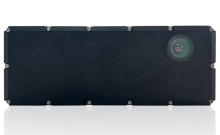Traffic Data System has introduced its WIM-DSP 32 system - digital signal processing – specifically for use with Kistler Lineas sensors and Kistler charge amplifiers.
The design WIM-DSP 32 system has an integral colour graphics display and touch keys for easy configuration and functional control
.
WIM-DSP 32 enables a broad range of applications, from simple WIM systems for statistical purposes to sophisticated Weigh in Motion Enforcement -- WIM-E -- systems with monitoring and control of lane changes.
RSSTraffic Data System has introduced its WIM-DSP 32 system - digital signal processing – specifically for use with Kistler Lineas sensors and Kistler charge amplifiers
The design WIM-DSP 32 system has an integral colour graphics display and touch keys for easy configuration and functional control.
WIM-DSP 32 enables a broad range of applications, from simple WIM systems for statistical purposes to sophisticated Weigh in Motion Enforcement – WIM-E – systems with monitoring and control of lane changes.
The lead-sealable aluminium housing of the WIM-DSP 32 and connecting cables to the2458 Kistler charge amplifiers comply with protection class IP67 (EN60529). The company said the WIM-DSP 32 can be used most effectively with the TMCS-U Remote Monitoring Station.
The TMCS-U is a complete TLS remote monitoring station with control module, integral function groups FG1, FG2 and FG6, integral UPS, 3G / UMTS modem and 16 inductive loop detectors / classifiers. Data and power supply cables between WIM-DSP 32 and TMCS-U and the inductive loop connections can be up to 300m long.
WIM-DSP 32 and TMCS-U have a high integration density with outstanding performance features and low power consumption. The TMCS-U and WIM-DSP 32 assemblies ensure precise time synchronisation with optional data signature.
The WIM-DSP 32 also simplifies installation and operation of WIM systems. The company said the reduced number of cable connections and terminations alone makes a major contribution to the reliability and performance of the overall system.
The WIM-DSP 32 supports an array of up to 32 Lineas sensors which can be arranged in any configuration. Known sensor geometries enable different wheel tracks to be combined – in the simplest case, the left and right neighbouring tracks.
The scenarios described above can also be supplemented by sensors installed at an angle to determine the position in the lane and to establish the type of tyres, single or twin.
RSS
The design WIM-DSP 32 system has an integral colour graphics display and touch keys for easy configuration and functional control.
WIM-DSP 32 enables a broad range of applications, from simple WIM systems for statistical purposes to sophisticated Weigh in Motion Enforcement – WIM-E – systems with monitoring and control of lane changes.
The lead-sealable aluminium housing of the WIM-DSP 32 and connecting cables to the
The TMCS-U is a complete TLS remote monitoring station with control module, integral function groups FG1, FG2 and FG6, integral UPS, 3G / UMTS modem and 16 inductive loop detectors / classifiers. Data and power supply cables between WIM-DSP 32 and TMCS-U and the inductive loop connections can be up to 300m long.
WIM-DSP 32 and TMCS-U have a high integration density with outstanding performance features and low power consumption. The TMCS-U and WIM-DSP 32 assemblies ensure precise time synchronisation with optional data signature.
The WIM-DSP 32 also simplifies installation and operation of WIM systems. The company said the reduced number of cable connections and terminations alone makes a major contribution to the reliability and performance of the overall system.
The WIM-DSP 32 supports an array of up to 32 Lineas sensors which can be arranged in any configuration. Known sensor geometries enable different wheel tracks to be combined – in the simplest case, the left and right neighbouring tracks.
The scenarios described above can also be supplemented by sensors installed at an angle to determine the position in the lane and to establish the type of tyres, single or twin.
RSS








